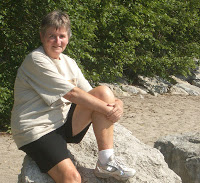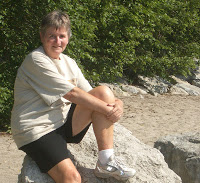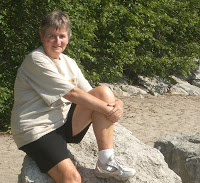I thought about this in the sense of escaping, but we’re going to write about escape in a very few weeks so I’ll skip that idea.
So now what? I guess I’ll just have to re-cover some old ground and pepper it with quotations to make it seem more interesting!
Writing or talking of my mad dash from the closet, I have often likened it to hurtling along on a runaway train over which I had little, if any, control. It was almost as if I had never actually made that conscious decision to come out, although of course I had, at some level. But it didn’t feel like that. It simply felt as if some wild-west movie train with a big old cow-catcher on the front had scooped me up and run away with me. (As Kimberly McCreight says, in Reconstructing Amelia, ‘Sometimes its hard to tell how fast the current’s moving until you’re headed over a waterfall.”’) I had no objection, but I was just along for the ride until we got wherever we were going. Doug Cooper, in Outside In, asks, ‘Am I running away or moving forward?’ It’s difficult to feel firmly that you are moving forward when you have very little vision of where you are going. Yet in a way, I did know. I knew I was going to be openly gay. What I did not know was what exactly that meant. But that was not truly having no destination; rather it was having no experience or knowledge of that destination. As Glenda Millard says, in A Small Free Kiss in the Dark, ‘Running away was easy; not knowing what to do next was the hard part.’
As a child I never remember harboring thoughts of running away, or wanting to. On the other hand I was often accused of letting my imagination run away with me. Thinking back on that now, it sounds very like a somewhat passive form of running away; which, in turn, sounds typical of me – back to the cowcatcher and that runaway train. I seem to have a pattern of allowing things to happen to me rather than proactively forcing the pace.
And, as I continue thoughts along that vein, that seems still to be true. Now it is time constantly running away with me. I am not running away from or towards anything. Life is close to perfect right where I am. But alas time is not content to let me be. Time rushes headlong at me from the moment I put a foot on the floor in the morning. It grabs me up and rushes me through the day. I am by nature an early riser; nevertheless before I have even planned my day it is lunchtime and before I actually start anything it’s suppertime which means it’s almost bedtime. Life is one constant rush to keep up with itself.
Why does it do that when we are running out of time, anyway? Surely time should slow down in order to preserve as much as possible of what is left; but no, off it speeds in a rush towards the point where it, or at least our portion of it, will, inevitably, run out.
And on that cheery note I shall give up on this topic. But I want one erudite end quote; something that will anchor my ramblings with style. I don’t even have to turn to The Web, I already have the perfect words stored midst the jumble of quotations in my head.
“How did it get so late so soon?
It’s night before it’s afternoon.
December is here before it’s June.
My goodness how the time has flewn.
How did it get so late so soon?”
Dr. Suess
© March 2018
About the Author
I was born and raised in England. After graduation from college there, I moved to the U.S. and, having discovered Colorado, never left. I have lived in the Denver-Boulder area since 1965, working for 30 years at IBM. I married, raised four stepchildren, then got divorced after finally, in my forties, accepting myself as a lesbian. I have been with my wonderful partner Betsy for thirty years. We have been married since 2013.









